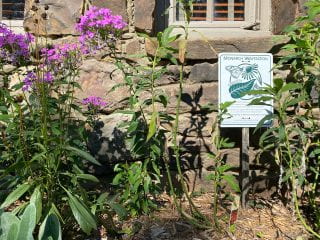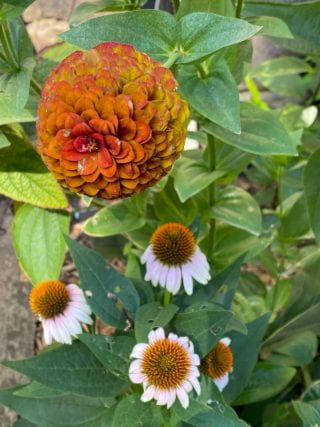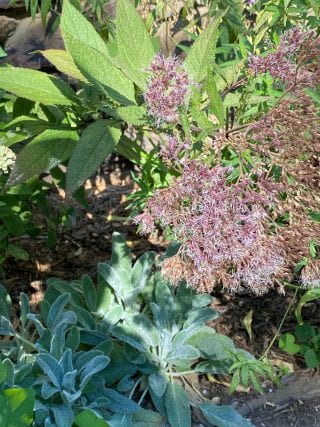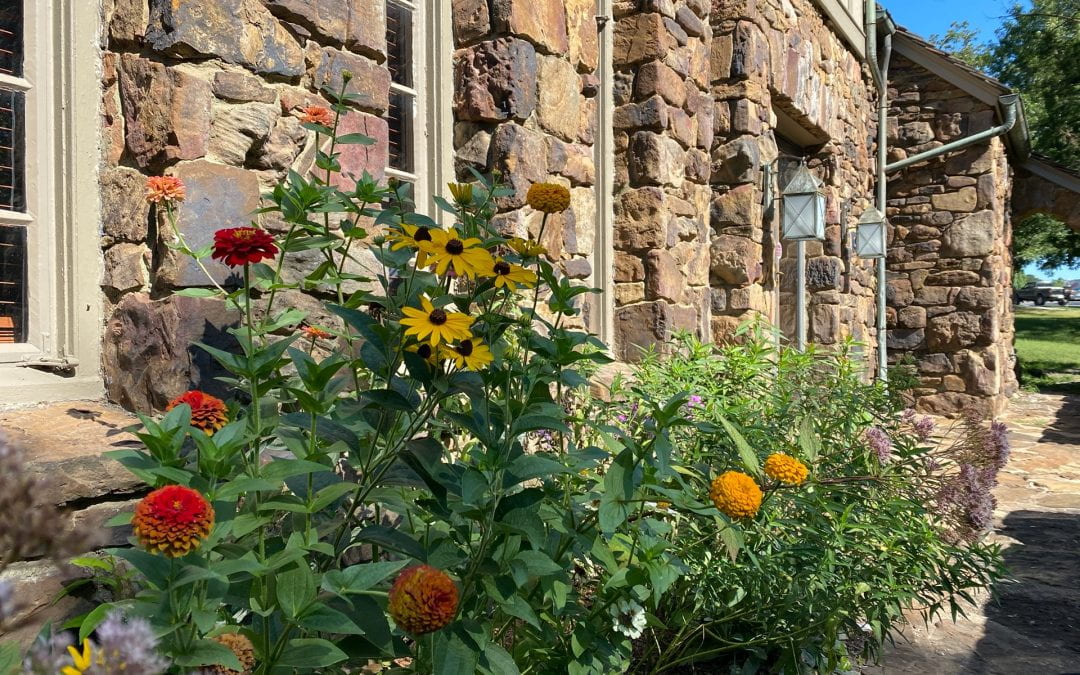 In the fall of 2020, an interested university employee and long-time monarch butterfly enthusiast began to work on creating a pollinator garden in a dormant flowerbed in front of her office. That spring, the campus received a new monarch waystation certified by monarchwatch.org.
In the fall of 2020, an interested university employee and long-time monarch butterfly enthusiast began to work on creating a pollinator garden in a dormant flowerbed in front of her office. That spring, the campus received a new monarch waystation certified by monarchwatch.org.
Melissa King, marketing manager at the University of Arkansas Press, located in the McIlroy House building on the southwest corner of campus, spends her personal time promoting monarch butterflies in her home pollinator garden. Last fall, as she walked by a dormant flowerbed space in front of McIlroy House on her way into work every day, she noticed how the bed had become overgrown with invasive vines, particularly vinca and euonymus. These plants, deemed invasive by the city of Fayetteville, had clearly invaded the flowerbed and were even climbing up the walls of the stone building.
Melissa got permission from Facilities Management and her supervisor to clean out the flowerbed, she gathered up a few coworkers, and they got to work. There were a few work sessions last fall to dig out the vines by their very large and established roots.
When spring came (and after a social distancing spring work session happened), it was time to plant the monarch pollinator garden.
The monarch butterfly lays its eggs exclusively on milkweed leaves, so every monarch pollinator garden includes at least one species of milkweed. The Press garden includes two species so far, along with many plants that monarchs and butterflies of all kinds use for nectaring. The press garden has, in addition to milkweed, coreopsis, jo-pye weed, garden phlox, coneflower, lamb’s ear, ajuga, parsley, and iris.
“The idea is to plant a garden that is beautiful, sustaining of monarchs and other pollinators, easy to maintain, and with as many native plants as possible,” Melissa said. We also want to source our plants from local businesses as much as possible.’”
As waystation number 27843, the Press garden will endeavor to meet several monarchwatch.org recommendations. In addition to the host and nectar plants, the press garden will consider plant density (caterpillars need shelter and hiding places), will not use insecticides, will mulch for water retention, and will include host plants for other species of butterflies (parsley, for example, is a host plant for swallowtail butterflies).
Melissa has been promoting monarchs for eleven years since her son Jackson learned about the monarch butterfly in elementary school and spotted milkweed plants on a trip to the plant nursery. Since then, she has planted milkweed in her garden every year. Her yard is now a certified waystation itself, she has raised monarch butterflies from eggs, tagged adult monarchs from her garden to participate in research on the monarch migration, and begun to volunteer in the educational butterfly programs at the Botanical Gardens of the Ozarks. In November of 2019, she even traveled to the mountains of central Mexico to see the overwintering sites of the monarchs.
Jackson is now a high school senior who will attend the University of Arkansas in the fall. With a looming empty nest, Melissa is interested in planting more gardens at the University of Arkansas in May and June to be ready for the monarch migration when it comes to Fayetteville in the fall.
“It’s usually around late September and early October that we start to see heavy migration in Fayetteville,” Melissa said. “One-day last fall the monarchs were like a parade up and down McIlroy Avenue, one after another, all heading in the same direction. It’s amazing to me how, walking from my office to get a cup of coffee, I could see a small piece of one of the world’s natural wonders, a trip being taken by millions and millions of butterflies to central Mexico every year. From the University of Arkansas campus, we see them coming down to nectar as they head to Mexico, and back again in the spring.”
Melissa is looking for other garden spots around campus to repeat her efforts. “It’s the perfect time for it,” Melissa said. “Gardening is very doable with social distancing, it can be very therapeutic, and it will be nice for students, staff, and faculty to return to campus with a few well-tended pollinator gardens in the fall.”
If you’re interested in learning more, recommending a pollinator garden spot, or volunteering to help, call Melissa at 479-966-7420.
